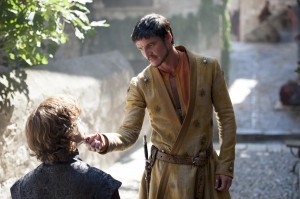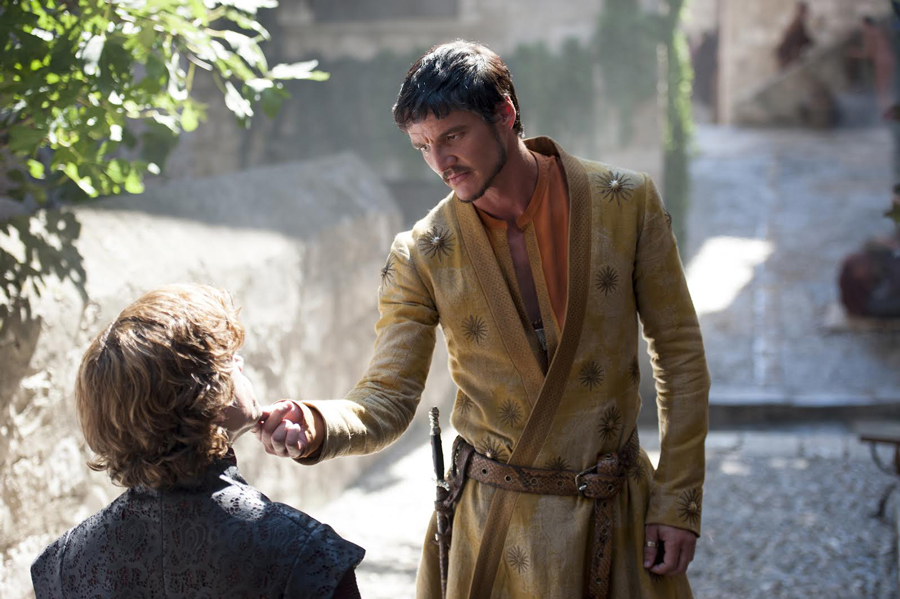HBO’s Game of Thrones slays viewer expectations
Game of Thrones is back, and the bodies — from warm-blooded lovers to frostbitten corpses — are already piling up.

The unpaid debt · The fourth season of HBO’s Game of Thrones introduces Oberyn Martell, played by Pedro Pascal, a vengeful libertine who blames the Lannisters, including Tyrion, played by Peter Dinklage, for the death of his beloved sister. – Photo courtesy of HBO
Eleven months after the horrific events of the Red Wedding left millions of viewers simultaneously anguished and awestruck, HBO’s adaptation of George R.R. Martin’s sprawling fantasy series returned with a vengeance last Sunday. The fourth season’s premiere episode, “Two Swords,” was a conscious effort to convince audiences — especially those familiar with the books — that the show’s narrative momentum hasn’t slowed in the wake of the Lannisters’ treacherous victory over House Stark in the penultimate episode of the third season. In fact, between the ice zombie menace to the North and Daenerys Targaryen’s dragon-assisted slave rebellion to the South, “Two Swords” suggests that the stakes have never been higher. Winter has come to Westeros, and the real battle for the Iron Throne is just getting started.
The episode opens in King’s Landing, with ruthless patriarch and architect of the Red Wedding Tywin Lannister, played once again with magisterial disdain by the great Charles Dance, melting down the late Robb Stark’s prized Valyrian sword and forging two new blades in its place. The first is meant for his son Jaime, played by Nikolaj Coster-Waldau, who has rejoined the Kingsguard against his father’s wishes while adjusting to life as a permanent southpaw. The second blade is a wedding present for Tywin’s grandson, the loathsome King Joffrey, played to smirking, sniveling perfection by Jack Gleeson. The symbolism is inescapable: The Lannisters have secured their right to rule and are now free to recast history as they please.
Yet as any bald eunuch with constantly shifting allegiances will tell you, power is a curious thing. In truth, the Lannister victory is fragile and illusory at best. Fan-favorite Tyrion Lannister, portrayed by Emmy winner Peter Dinklage, knows this all too well. After years of watching his father and scheming sister Cersei (Lena Headey) forsake honor in order to crush their enemies and expand their influence, the cunning imp — who’s still trying to circumvent his arranged marriage to the grieving Sansa Stark (Sophie Turner) and help the poor girl escape the gilded cage of King’s Landing once and for all — knows that nothing gained as a result of the Red Wedding is built to last.
This ominous feeling only intensifies after he meets Prince Oberyn Martell, played by newcomer Pedro Pascal, who’s in town to attend the royal wedding of Joffrey and the coyly manipulative Margaery Tyrell (Natalie Dormer). Oberyn, also known as the Red Viper, is a swaggering hedonist whose omnivorous sexual appetite is exceeded only by his desire for vengeance against Lannister henchman Gregor “The Mountain” Clegane (played by Hafthor Julius Bjornsson), who raped and murdered his younger sister during the dethronement of the Mad King many years earlier. He makes no secret of his true agenda, telling Tyrion, “The Lannisters aren’t the only ones who pay their debts.”
The rest of the Seven Kingdoms are also on edge following the deaths of Robb and Catelyn Stark and the dissolving of the Northern Army, proving that even the calm between the storms is fraught with peril in Westeros. After months spent on a deep-cover mission beyond the Wall, Jon Snow (Kit Harington) is facing trial for cavorting with wildlings, including his fiery ex-lover Ygritte (Rose Leslie), while desperately trying to warn his Night’s Watch brothers about the encroaching Free Folk Army led by Mance Rayder (Ciarán Hinds), who plans to lay siege to Castle Black and slaughter its inhabitants.
Elsewhere, pint-sized swashbuckler Arya Stark (Maisie Williams) has entered into an unholy alliance with her fearsome enemy-turned-traveling-companion the Hound (Rory McCann), roaming the countryside and killing Lannister bannermen on their way to reunite with her remaining family in Riverrun. It’s been fascinating to watch Arya’s progression from precocious moppet to traumatized orphan to avenging angel over the course of the last three seasons, but that admiration quickly gives way to concern when the episode reveals the extent of her emerging bloodlust.
Then there’s Daenerys (Emilia Clarke), who seems on the precipice of raising a free army large enough to sail to Westeros and reclaim her birthright, if only she can keep control of her rapidly maturing, increasingly dangerous dragons. Watching the last Targaryen — the last one we know of, anyway — decide whether to be a liberator or a conqueror was one of last season’s principal pleasures, and it’s a choice she’ll likely face again if she ever makes it across the sea.
After three seasons of beheadings, royal incest and spontaneous smoke demon births, Game of Thrones could be forgiven for settling into more familiar rhythms, but showrunners David Benioff and D.B. Weiss appear determined to continue expanding and refining the already insanely ambitious series, which was renewed for a fifth and sixth season the week following the premiere. The onus now falls on Martin, who writes the occasional episode and recently released a chapter from the series’ newest installment, The Winds of Winter, to keep pace with the show while crafting a quality finale that will be worthy of the meticulous, miraculous world he’s created.
Self-mythology and the limits of control have been the major themes of the season thus far, whether it be Tywin’s obsession with his legacy, Stannis Baratheon’s attempts to control the fate of his enemies by appealing to the Lord of Light or Arya and the Hound’s hilarious but telling argument over whether it’s ever appropriate to name one’s sword. As always, the show’s greatest strength isn’t its rousing action scenes or its majestic highland settings but rather its willingness to upend audience expectations and reveal hidden depths to characters that, at first glance, seem like stodgy fantasy archetypes.
Game of Thrones is a story with no clear-cut heroes or villains, just a bunch of deeply flawed individuals struggling for a sense of power and purpose in a world where wickedness is sometimes rewarded and kindness can be a punishable offense, where the outcomes feel surprising and authentic instead of clumsy and predetermined. In an age where so much of our fiction is drowned in formula, what more can one ask for?
Just don’t expect a happy ending. As Tyrion himself says: “If you want justice, you’ve come to the wrong place.”
Landon McDonald is a graduate student studying public relations. His column, “The Reel Deal,” runs Thursdays.

